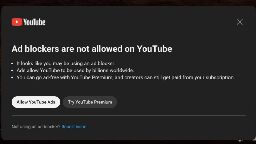Windows Phone gets revenge on YouTube from the grave by helping users bypass its ad-blocker-blocker



windowscentral.com
Windows Phone gets revenge on YouTube from the grave by helping users bypass its ad-blocker-blocker::Windows Phone to the rescue. A lot of YouTube users want to know how to get around the new annoying YouTube pop-up telling viewers to disable their ad-blocker.
You are viewing a single comment
I doubt it, unfortunately.
Like many other online services they've saturated the market so the only way to increase profits is to extract more money from individual users.
They are also a quasi-monopoly for a reason - hosting and streaming video is resource-intensive, so I wouldn't hold my breath for a free alternative that would scale. AFAIK, piped and such are only frontends to youtube which will be killed off by ToS or through technical means.
Maybe there are free video sites that also host their videos, but as I said, since it quickly becomes very expensive, I don't see anyone being able to do that for free for long.
Unfortunately, if anyone is going to "disrupt" youtube, it is going to come from a silicon valley startup and like youtube they will only burn investor capital for a limited time - until they have saturated the market (or failed). Then they'll have to monetize as well.
My only hope is something like a torrent approach where everyone who streams also hosts. But since that is technically difficult to perfect, needs a huge user base to succeed while not promising any commercial gain for the initiating party, nobody will throw a ton of money at the problem, so I wouldn't hold my breath.
My prediction is that people will either pay for premium or see ads in the mid- to long-term.
We need to think about what people did before YouTube. It was already gaining traction around 2006, but before that you could still watch videos on different websites, it was just decentralized and videos were hosted on smaller pages. You might even see a website dedicated to a single video. YouTube’s incredibly convenient, but internet video can and will survive without it.
I am sure other platforms / personal hosting will continue to exist in the future. They simply won't be relevant in terms of video streaming market share.
The network effect of youtube is massive. They have a huge amount of content creators and audience. That means the audience will stick around for the creators and the creators go for the biggest audience and hence the most views.
Being google, they have data centers all over the globe, provide a fast app / browser access for any OS, can cast to a TV with one click - all these equal convenience which cannot easily be beat by any individual website.
Some huge youtube brands like linus media group are trying with floatplane as their own paid video hosting service, but I'm sure their view numbers are insignificant compared to youtube even though they are the biggest players.
Nebula is pretty decent. It's like if you took all the best content off of YouTube that would also fit in well at The Discovery Channel.
Thanks for the reminder. I've been wanting to try it out.
There's a significant aspect of scale being ignored when you talk about video sites before Youtube took off.
Not a single one of those self hosted sites had anywhere near the storage that youtube allows. Want a video from over a year or two ago? Hope you downloaded it or the creator loved it enough to leave it up. Frame rates? Resolution? What are those? I understand that tech has advanced as well, and those issues would not be as severe now, but I really doubt that a lot of channels even now would be able to keep the same lengthy back catalog of old content if they were self hosting.
I also think that there are countless channels that would never have existed if the creators had to figure out hosting their own site, setting up streaming of the video files on it, potentially managing their own comments plugins, potentially managing their own methods to keep viewers aware when new content was posted, and having to somehow spread the word of their existence without the aid of an existing platform trying to keep people viewing things for more ad impressions.
The monopoly of Youtube is a problem, the lack of easy to use and configure open alternatives is a problem... but we can't ignore the massive impact Youtube had in lowering the barrier to entry and upkeep costs of being a content maker.
There are a lot of hurdles to content creation and hosting that Youtube enables creators to completely ignore.
Also, lots of the younger generations didn't really mind the ads. After this news showed up, we had a discussion going on my company discord. Most of the older people started sharing workarounds but most of the younger people said that they've been using YouTube with ads and didn't see any problem with it.
I've seen the same. I wonder if the older you get, the more you value your time.
I remember seeing lots of ad breaks on TV when I was a kid and it didn't stop me from watching a show. Now if an ad break happens, I am reminded why I don't own a TV and turn it off.
In my case, it's less of a "value my time" and more "I'm just tired of being advertised to constantly and want a break"
I agree that the sheer quantity of resources required to host videos is hard to be able to compete, but there’s also Invidious, which is the fediverse equivalent. As with other fediverse applications, it will largely depend on the people running the instances and how much they storage they can support.